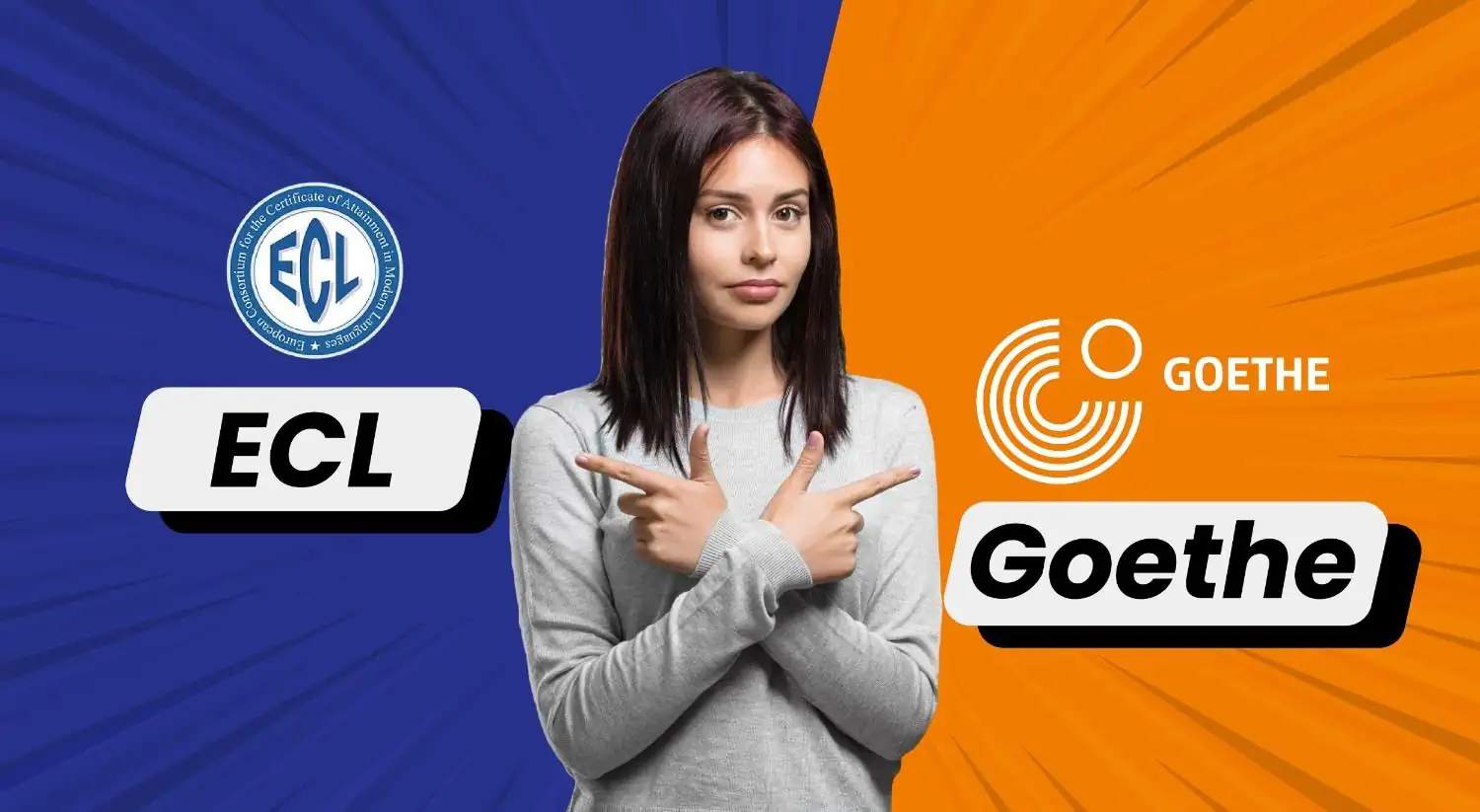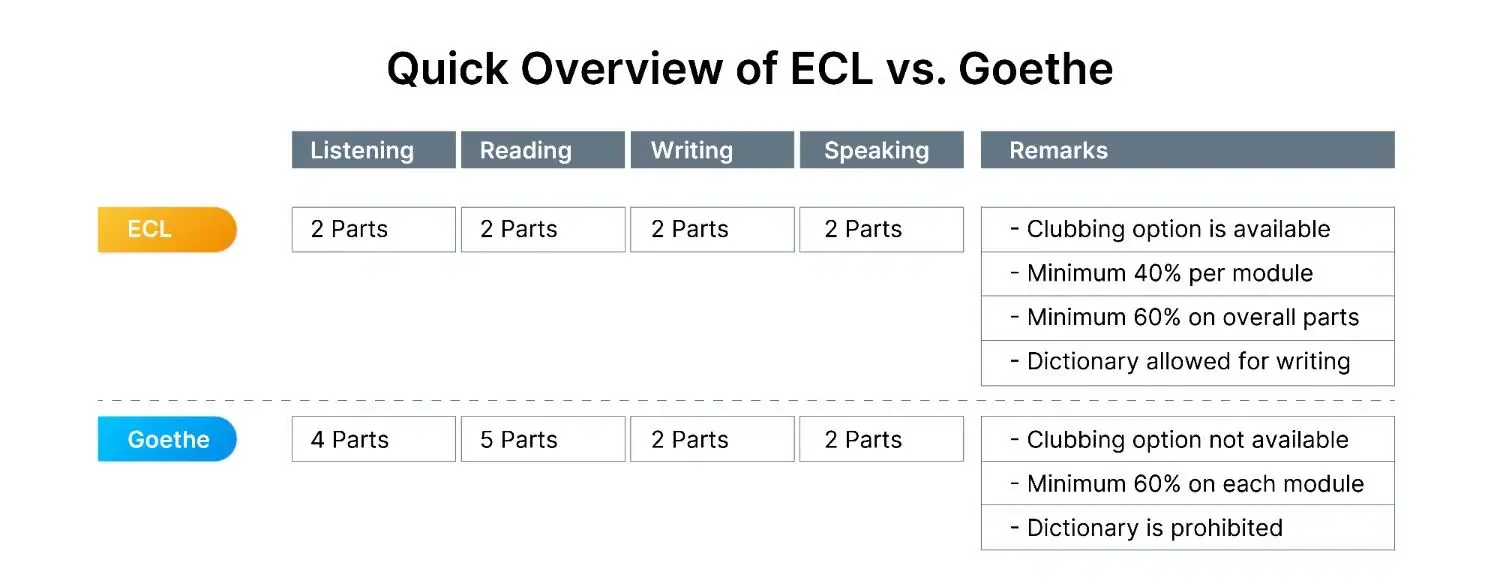
ECL vs Goethe : Which Language Certification Is Better for You?

If you are looking to move to any country that is part of the European Union, there is more than one route to get you there. One of the pre-requisites for moving to any EU country is a language certificate—you need to be able to speak the language of the country of your choice to be eligible to work, study, and live there.
There are many language exams that you can clear to get your eligibility certificate. If your eye is on Germany, then two of the best language exams are ECL and Goethe. You need to clear just one of these two exams in order to be eligible for a German Visa. However, these two exams are quite different from one another.
Let’s take a closer look at the differences between ECL and Goethe language exams.
Overview of ECL and Goethe

1. ECL Certification
ECL is a standardised format for language testing. It is essentially a templated exam that follows the same format across countries in the EU. In fact, the ECL format is an accepted form of testing in:
| Bulgarian | Croatian | Czech | English |
| French | German | Hebrew | Hungarian |
| Italian | Polish | Romanian | Russian |
| Serbian | Slovak | Spanish | – |
ECL stands for “European Consortium for the Certificate of Attainment in Modern Languages.” It is an international standardised exam system that is customised to test the proficiency of languages of EU member states and EU candidate countries.
Now, let’s take a look at the competition.
2. Goethe Certification
Unlike ECL, Goethe is not a standardised format that applies to the entire EU. The Goethe language certification was created by the Goethe-Institut to improve the language skills of expats who wish to live, work and study in Germany.
Therefore, it concentrates deeper on the German language. For anyone looking to settle in Germany, the Goethe exam can be considered to be comprehensive and more difficult than the ECL—based on format alone.
This blog will take you briefly through the formats for both exams, so that you can have a better idea of which language certification is better for your journey to studying and working in Germany.
Comparison of Exam Structure and Format
Levels of Proficiency
| Level A2 (Beginner)
This level tests simple and direct communication exchanges in a foreign language. |
Level B1 (Elementary)
Clearing this level means the candidate is able to handle communication in workplaces, schools, group interactions, etc. |
| Level B2 (Intermediate)
B2 proficiency is a great indicator as to whether a candidate can manage and study in the language comfortably. |
Level C1 (Advanced)
C1 is an indicator that the candidate has no barriers to the language—they are able to understand the language at all capacities. |
ECL Exam Structure
1. Reading
| Levels | A2 | B1 | B2 | C1 |
|---|---|---|---|---|
| Time (mins) | 35 | 35 | 45 | 45 |
| No. of Tasks | 2 | 2 | 2 | 2 |
2. Writing
| Levels | A2 | B1 | B2 | C1 |
|---|---|---|---|---|
| Time (mins) | 35 | 40 | 60 | 75 |
| No. of Tasks | 2 | 2 | 2 | 2 |
3. Listening
| Levels | A2 | B1 | B2 | C1 |
|---|---|---|---|---|
| Time (mins) | 15-20 | 20-25 | 25-30 | 30-35 |
| No. of Tasks | 2 | 2 | 2 | 2 |
4. Speaking (Multiple candidates)
| Levels | A2 | B1 | B2 | C1 |
|---|---|---|---|---|
| Time (mins) 2 candidates | 15-18 | 18-20 | 18-20 | 18-20 |
| Time (mins) 3 candidates | 22-25 | 28-30 | 28-30 | 28-30 |
| Time (mins) 1 candidates | 10-12 | 13-15 | 13-15 | 13-15 |
| No. of tasks | 2 | 2 | 2 | 2 |
Mark Distribution
- Oral Portion: A candidate must secure a minimum of 40% in the Speaking and Listening portions of the examination. However, the average of both parts together should meet a minimum score of 60%.
- Written Portion: A candidate must secure a minimum of 40% in the Writing and Reading portions of the examination. However, the average of both parts together should meet a minimum score of 60%.
A candidate has the option to attend all 4 exams together in a single attempt. However, they can also choose to attend the examination by clubbing two modules together. The modules in the clubbed parts are fixed and cannot be interchanged. The modules can be clubbed as follows:
Part 1 – Reading & Writing
Part 2 – Listening & Speaking
Goethe Exam Structure
Since the Goethe is a German-oriented language exam, it breaks down the difficulty of the exam based on the proficiency level. Here is a quick overview on how you can distinguish the German language certification levels of Goethe.
| Levels | A2 | B1 | B2 | C1 |
|---|---|---|---|---|
| Reading | 30 Minutes | 65 Minutes | 65 Minutes | 65 Minutes |
| Listening | 30 Minutes | 40 Minutes | 40 Minutes | 40 Minutes |
| Writing | 30 Minutes | 60 Minutes | 75 Minutes | 75 Minutes |
| Speaking | Individual
Pair
|
Individual
Pair
|
Individual
Pair
|
Individual
Pair
|
| Tests for | Ability to communicate and participate in basic, daily and familiar topics. | Ability to understand important aspects of familiar matters like work, school, hobbies, etc. | Candidates should be able to understand complex blocks of texts and hold conversation with native speakers. | Capability of candidate to speak in public, private and academic settings in both casual and formal contexts. |
Quick Comparison of ECL vs. Goethe
Now that we have a brief idea of the way both exam formats work, let’s take a moment to have a quick comparison between ECL and Goethe to give you a better idea about how these 2 German language exams stack up against each other.
| Listening | Reading | Writing | Speaking | Remarks | |
|---|---|---|---|---|---|
| ECL | 2 Parts | 2 Parts | 2 Parts | 2 Parts | Clubbing option is available – Minimum 40% per module – Minimum 60% on overall parts – Dictionary allowed for writing |
| Goethe | 4 Parts | 5 Parts | 2 Parts | 2 Parts | – Clubbing option not available for A2 – Minimum 60% on each module – Dictionary is prohibited |
Recognition and Acceptance
When it comes to proving your German language skills for academic or professional opportunities in Germany, both the ECL and Goethe certifications hold value. However, each has unique strengths that cater to different needs, making the ECL certification an increasingly appealing option.
1. ECL Certification:
The ECL certificate is recognized across Europe as a standardised exam for multiple European languages, including German. Its primary strength lies in its practical approach to testing real-world communication skills, making it particularly suitable for international contexts.
- For Universities
While the Goethe certificate is traditionally the go-to for German universities, the ECL certification is gaining traction, especially for international students applying to programs in Germany.
- For Companies
German companies, particularly those with a European or international focus, often recognize the ECL certificate when they evaluate candidates for open positions. ECL is a strong choice for job applicants looking for steady, professional work in Germany.
2. Goethe Certification:
The Goethe certificate is widely recognized in Germany and internationally, with a strong focus on German language proficiency. Being aligned with CEFR, Goethe is considered as a prominent and well-regarded language certification for all professional purposes.
- For Universities
Most German universities accept Goethe, particularly at levels B2 or C1, as proof of proficiency for programs taught in German.
- For Companies
Goethe is also standardised, specifically for the German language. That is why Goethe is such a reliable option for those seeking to build their career in Germany.
Key Advantage of ECL:
The ECL certification’s flexibility and recognition across multiple European languages make it an excellent choice for candidates seeking a broader scope of opportunities, especially in multinational or European contexts.
While the Goethe certificate is deeply rooted in Germany, the ECL’s growing reputation ensures it stands out as a flexible, practical option for both educational and professional objectives.
Conclusion
There is more than one way to prove your communication skills for your German Visa. ECL and Goethe are great hallmarks that can help you get your foot in the door of this great nation—allowing you to set the foundation to study, work and thrive in Germany.
ZEIQ Consultants is the only establishment in India that offers German ECL Exam centres. We are also recognised by the ECL Consortium. As such, ZEIQ Consultants follows the strictest guidelines for fairness and impartiality when conducting German ECL examinations in India.
So, if you are looking to make your way to Germany, ZEIQ is the best choice for German Language training and certification in India for all levels from A2 to C1 without prejudice.
Contact us or visit our website to know more.
FAQs

